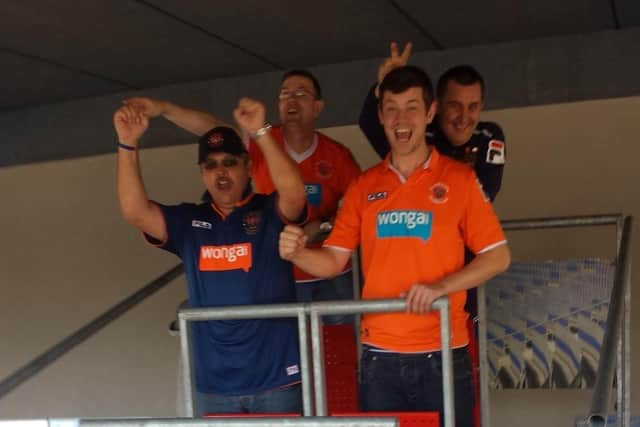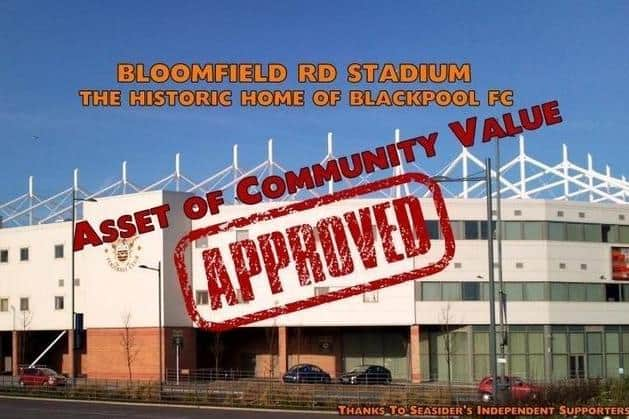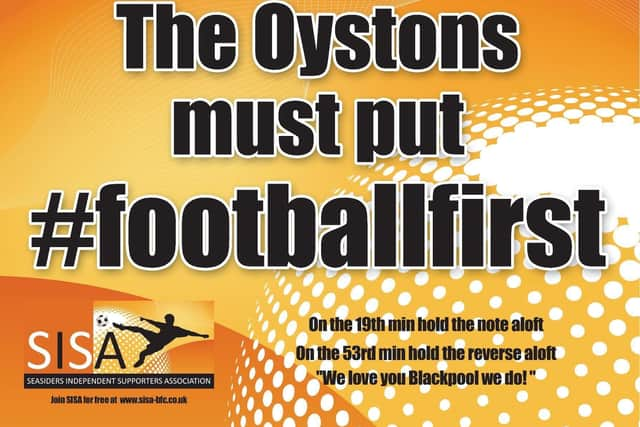Remembering SISA, the Blackpool fan group that helped oust the Oystons, on its 10th anniversary
and live on Freeview channel 276
On January 11, 2013, a group of like-minded Blackpool fans came together to hold a meeting as discontent about the club’s owners began to grow.
The independent fans’ group would become Seasiders Independent Supporters’ Association, or SISA for short.
Advertisement
Hide AdAdvertisement
Hide AdOn that day, the group wrote on its recently-formed Twitter page: “The fans have had enough of the poor running of our football club #TangerineTruth”.
While the group’s membership began with modest numbers, they soon expanded before later becoming Blackpool Supporters’ Trust (BST).
The group was responsible for starting the Not A Penny More (NAPM) campaign, which helped starve the Oystons of revenue, securing an Asset of Community Value (ACV) on Bloomfield Road while also helping organise numerous protests.
Origins


Lee Good was one of two people to help get the group off the ground alongside friend and fellow fan Paul Brewster.
Advertisement
Hide AdAdvertisement
Hide AdThe two would then form a committee where they were joined by Tim Fielding, Dean Williamson, Nathan Tate and the late Kevin Boroduwicz.
“I had known Paul for years, we used to go to the matches together,” Lee explained.
“It had just turned 2013 and it was the end of Michael Appleton’s first reign, which was the first sign of the wheels starting to come off.


“We felt the fans weren’t being listened to. We had Blackpool Supporters’ Association (BSA) but there was club involvement and there was a feeling of real frustration, so we just felt an independent voice was needed for the fans.
Advertisement
Hide AdAdvertisement
Hide Ad“I got a phone call from Paul on this particular morning and he said he needed my help, because he had set up this independent supporters’ club online and they were meeting at the old Number One club, which is now the Armfield, and he needed someone to front it.
“It transpired from there and at that point we were just using social media, Facebook and Twitter to get the message out there and get people to turn up.
“On the Saturday we had a meeting in one of the lounges and I’d say about 40 or 50 people turned up to the first one.


“We just wanted to get like-minded fans together, we were just debating stuff but we decided to push ahead with it and we formed a committee from there.
Advertisement
Hide AdAdvertisement
Hide Ad“Tim Fielding was involved in the first meeting, he came along and Kevin Boroduwicz, who sadly passed away last year, he also had a big influence.
“We organised a few events and the first big protest we did was the coffin march, where a good few hundred people turned up to march around the ground. A couple of weeks later, we were handing out flyers of bank notes.
“Our motto, which BST took on, was ‘Put Football First’ and it grew and grew from there.
“I think SISA’s biggest achievement was getting the Asset of Community Value (ACV) on Bloomfield Road.
Advertisement
Hide AdAdvertisement
Hide Ad“But ultimately, as we were getting deeper and deeper into it, we were finding as we were going on it was harder and harder to get publicity because we were independent, so that’s where we took advice off other supporters’ groups and fans around the country to apply to become a Trust, which is where BST was born and it went from there really.”
Progress
While it was ultimately Valeri Belokon’s court action that ousted Owen Oyston in 2019, the NAPM campaign certainly played a key role in his demise.
“BST achieved massive amounts,” Lee added.
“The NAPM campaign was a brainchild of the SISA days but once you become a Trust, we found the national media were beginning to listen.
“The likes of Christine Seddon joined as we became BST and as a spokesperson she was amazing. There’s been loads of people who have been involved in it over the years.
Advertisement
Hide AdAdvertisement
Hide Ad“We also worked in conjunction with the likes of Tangerine Knights doing the Judgement Day protests and stuff like that.
“The litigation then began to start and obviously Tim was the main one within our group who was sued.
“Looking back at these times, it helps put things into perspective when we’re whingeing at the moment about being third bottom of the Championship.”
Future
While BST’s role post-Oystons isn’t as significant as it once was, there’s still plenty of work to be done.
Advertisement
Hide AdAdvertisement
Hide AdThe Trust were the first to propose an independent regulator for English football in 2018, something that is now close to coming to fruition.
“I still think there’s an important role for BST to play,” Lee said. “I’m a lifetime member and I still go along to the meetings.
“Ultimately, one of BST’s main aims was fan representation on the board. With the initial interim board that came in before Simon Sadler bought the club, we had that with Tim but I still think it should happen.
“BST are now championing football governance and making sure what happened to us doesn’t happen to other clubs and that’s the right way to go.
Advertisement
Hide AdAdvertisement
Hide Ad“We had a lot of support, a lot of groups from all over the UK really helped us – the likes of Blackburn Rovers, Derby County, Everton, Brighton, Leyton Orient – clubs who have been through similar stuff.
“I think it’s important because it still goes on, doesn’t it? Pushing for that governance, fan representation and making sure clubs are being run the right way and to ensure they remain part of the community.”

